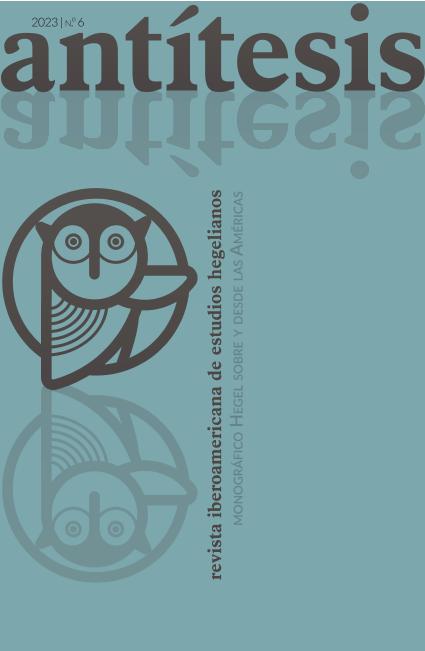Mostrar el registro sencillo del ítem
dc.contributor.author
Ferreiro, Hector Alberto

dc.date.available
2024-03-04T18:18:52Z
dc.date.issued
2023-12
dc.identifier.citation
Ferreiro, Hector Alberto; ¿Ha sido el continente americano "la tierra del futuro"?: Hegel y las Américas doscientos años después; Universidad Autónoma de Madrid; Antítesis; 6; 12-2023; 63-104
dc.identifier.issn
2735-7090
dc.identifier.uri
http://hdl.handle.net/11336/229284
dc.description.abstract
Hegel considera que América es un continente nuevo «en lo que respecta a su entera constitución física y espiritual». Con esto reproduce una imagen crecientemente dominante en el ambiente intelectual de la Europa de su época. Dicha imagen surge y cristaliza en el marco de consolidación de los procesos de colonización. Los pueblos de las regiones colonizadas mostraban en opinión de los observadores europeos un desarrollo civilizatorio menor que el de Europa. No pocos intelectuales encontraron la explicación a esas diferencias culturales en las diferencias naturales de la geografía, el clima y las razas respectivas. En este contexto, los indios americanos son a ojos de Hegel pueblos sin historia; en cuanto a la historia de América tras su conquista y colonización no es más que un episodio de la propia historia europea. En la medida en que es a través de la historia europea como el ser humano habría alcanzado la autoconciencia de su esencia, a saber: la libertad como autonomía y autodeterminación, Europa parece señalar una suerte de non plus ultra del desarrollo ideológico de la Humanidad. Sin embargo, vista en retrospectiva desde el siglo XXI la historia intelectual y política europea difícilmente permite ser identificada con la plena concientización del valor y dignidad que tiene cada ser humano como tal. Desde el momento que sus diferentes países es-tán fundados sobre el principio del nacionalismo cívico y no sobre el del nacionalismo étnico, propio de los países de Europa, el continente americano señala en este respecto un progreso en relación al «principio del espíritu europeo».
dc.description.abstract
By treating America as a «new» continent «by virtue of its wholly peculiar character in both physical and political respects» Hegel reiterates the increasingly dominant image of America in the Europe of his time. This image crystallized in the context of the consolidation of the colonization process. According to Europeans, the inhabitants of the colonized lands were far less civilized than the inhabitants of Western Europe. Not a few thinkers found the explanation for that cultural difference in the natural differences between the respective geographies, climates and races. In this general framework, Hegel considered the American Indians as people without history; as for the history of America after its conquest and colonization, it is in his eyes nothing other than an episode of the history of Europe itself. Insofar as it is through Europe´s history that human beings have attained self-consciousness of their essence, namely, freedom as autonomy and self-determination, Europe seems to be a non plus ultra of the ideological development of humanity. However, as seen from the perspective of the 21st century, the intellectual and political history of Europe can hardly be identified with the full awareness of the value and dignity of each human being as such. Since the countries of the American continent rely on the principle of civic nationalism and not on that of ethnic nationalism, which is typical for Europe, they signify, in this respect, a step forward with regard to the «principle of the European mind».
dc.format
application/pdf
dc.language.iso
spa
dc.publisher
Universidad Autónoma de Madrid

dc.rights
info:eu-repo/semantics/openAccess
dc.rights.uri
https://creativecommons.org/licenses/by/2.5/ar/
dc.subject
Hegel
dc.subject
Filosofía de la Historia
dc.subject
Eurocentrismo
dc.subject
Colonialismo
dc.subject
Racismo
dc.subject
Nacionalismo étnico
dc.subject.classification
Filosofía, Historia y Filosofía de la Ciencia y la Tecnología

dc.subject.classification
Filosofía, Ética y Religión

dc.subject.classification
HUMANIDADES

dc.title
¿Ha sido el continente americano "la tierra del futuro"?: Hegel y las Américas doscientos años después
dc.title
Has the American Continent been “the Land of the Future”?: Hegel and the Americas two hundred years later
dc.type
info:eu-repo/semantics/article
dc.type
info:ar-repo/semantics/artículo
dc.type
info:eu-repo/semantics/publishedVersion
dc.date.updated
2024-03-04T12:05:39Z
dc.identifier.eissn
2792-436X
dc.journal.number
6
dc.journal.pagination
63-104
dc.journal.pais
España

dc.journal.ciudad
Madrid
dc.description.fil
Fil: Ferreiro, Hector Alberto. Consejo Nacional de Investigaciones Científicas y Técnicas; Argentina. Pontificia Universidad Católica Argentina "Santa María de los Buenos Aires"; Argentina
dc.journal.title
Antítesis
dc.relation.alternativeid
info:eu-repo/semantics/altIdentifier/url/https://revistas.uam.es/antitesis/article/view/17847
dc.relation.alternativeid
info:eu-repo/semantics/altIdentifier/url/https://doi.org/10.15366/antitesis2023.2.003
Archivos asociados
